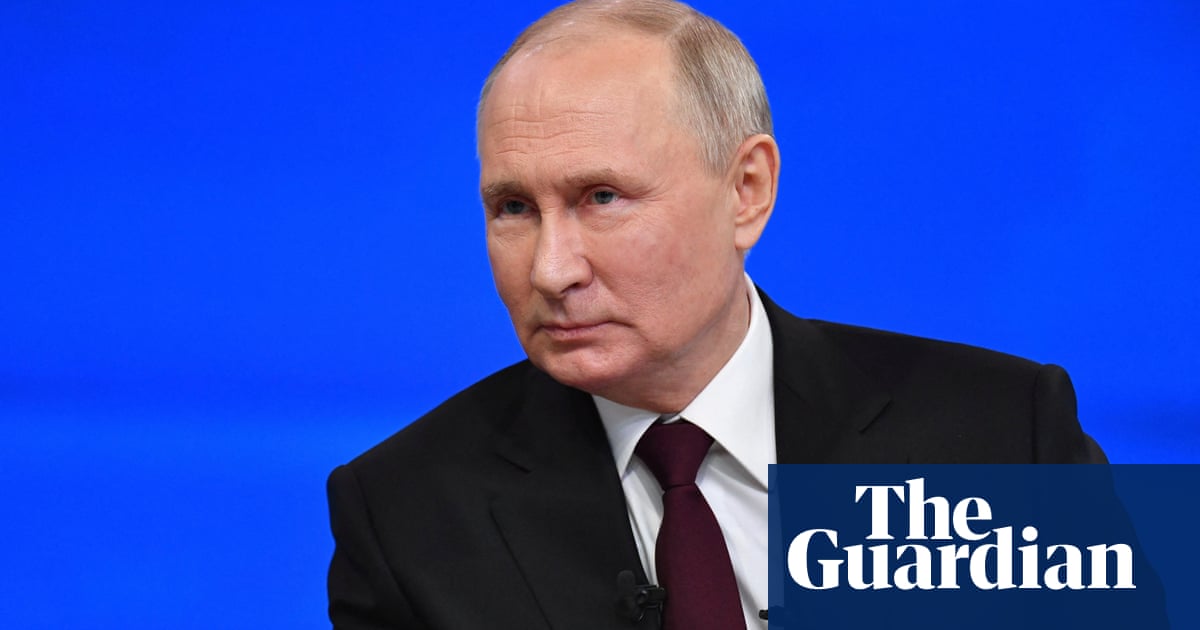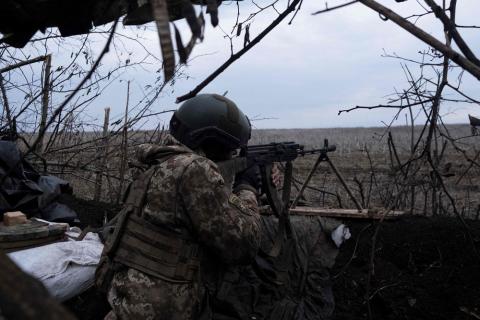
Says the responsibility for bloodshed lies with the Ukrainian “regime”
Warns other countries against interfering with the Russian action
KYIV, Ukraine: Russian President Vladimir Putin on Thursday announced a military operation in Ukraine, claiming it’s intended to protect civilians.
In a televised address, Putin said the action comes in response to threats coming from Ukraine.
He added that Russia doesn’t have a goal to occupy Ukraine. Putin said the responsibility for bloodshed lies with the Ukrainian “regime.”
Putin warned other countries that any attempt to interfere with the Russian action would lead to “consequences they have never seen.”
Soon after Putin"s announcement, explosions were heard in the Ukrainian capital, Kyiv.
Members of the UN Security Council on Wednesday pleaded with Russia to step back from the brink of war over Ukraine.
UN Secretary-General Antonio Guterres made a direct, impassioned appeal to the Russian president at the start of the second emergency Security Council session in three days.
“President Putin, stop your troops from attacking Ukraine, give peace a chance, too many people have already died,” Guterres said during the second emergency Security Council meeting in three days over the Russia-Ukraine crisis.
Just minutes later, Putin made a surprise speech on Russian TV, announcing he had “made the decision of a military operation.”
Although his announcement came just after the start of the Security Council session, the members who spoke stuck to their prepared speeches, which largely echoed Guterres’ appeal.
US Ambassador to the UN Linda Thomas-Greenfield appealed to Putin to “back away from the brink.”
“Send your troops and your tanks and your planes back to their barracks and hangars and send your diplomats to the negotiating table,” she said.
Accusing Putin of being willing to sacrifice countless lives to his “cynical ambition,” Thomas-Greenfield vowed that the international community would stand united against Russian aggression.
The council, where Russia holds the rotating presidency this month, was meeting just two days after another emergency session saw no support for Moscow’s decision to recognize two rebel regions of Ukraine as independent and to order Russian troops there for “peacekeeping.”
Council diplomats are now finalizing a draft of a resolution that would declare that Russia is violating the UN Charter, international law, and a 2015 council resolution on Ukraine, a diplomat said, speaking on condition of anonymity because the discussions were private. The resolution would urge Russia to come back into compliance immediately, the diplomat said.
Blaming Ukraine
The Kremlin said rebels in eastern Ukraine asked Russia for military assistance Wednesday to help fend off Ukrainian “aggression,” an announcement that immediately fueled fears that Moscow was offering up a pretext for war, just as the West had warned.
A short time later, the Ukrainian president rejected Moscow’s claims that his country poses a threat to Russia and said a Russian invasion would cost tens of thousands of lives.
“The people of Ukraine and the government of Ukraine want peace,” President Volodymyr Zelenskyy said in an emotional overnight address, speaking in Russian in a direct appeal to Russian citizens. “But if we come under attack, if we face an attempt to take away our country, our freedom, our lives and lives of our children, we will defend ourselves. When you attack us, you will see our faces, not our backs.”
Zelenskyy said he asked to arrange a call with Russian President Vladimir Putin late Wednesday, but the Kremlin did not respond.
In an apparent reference to Putin’s move to authorize the deployment of the Russian military to “maintain peace” in eastern Ukraine, Zelensky warned that “this step could mark the start of a big war on the European continent.”
“Any provocation, any spark could trigger a blaze that will destroy everything,” he said.
He challenged the Russian propaganda claims, saying that “you are told that this blaze will bring freedom to the people of Ukraine, but the Ukrainian people are free.”
Earlier Wednesday, diplomats from dozens of countries took the floor at the UN General Assembly to deplore Russia’s actions toward the country and plead for diplomacy.
Russia and ally Syria defended Moscow’s moves. But even China, which usually takes Russia’s side at the UN, spoke up for the world body’s longstanding principle of respecting countries’ sovereignty and internationally recognized borders, while not mentioning Russia by name.
Echoing a narrative being broadcast to Russians at home, Russian Ambassador Vassily Nebenzia portrayed his country as responding to the plight of beleaguered people in the breakaway areas. Russia claims Ukraine is engaging in violence and oppression, which Ukraine denies.
“We urge you today to focus on reining in Kyiv,” Nebenzia said.
Syria accused the West of using the assembly to pressure Moscow.
“The Ukrainian crisis was created by the Western states, led by the United States, to divide people and to undermine Russian security,” Ambassador Bassam Al-Sabbagh said.
Meeting a day after Western powers and some other countries imposed new sanctions on Russia, the 193-member General Assembly didn’t take any collective action. But the comments from nearly 70 nations, with more scheduled for Monday, represented the broadest forum of global sentiment since the crisis dramatically escalated this week.
Ukrainian Foreign Minister Dmytro Kuleba implored countries to use tough economic sanctions, strong messages and “active diplomacy” to get Russia to back off. A lackluster response would jeopardize not only Ukraine but the concept of international law and global security, he warned.
“We need to use this last chance for action and stop Russia where it is,” Kuleba said.
Russia seized Ukraine’s Crimea Peninsula in 2014, and pro-Russia rebels have since been fighting Ukrainian forces in the eastern areas of Donetsk and Luhansk. More than 14,000 people have been killed in the conflict.
After weeks of rising tension as Moscow massed over 150,000 troops on Ukraine’s borders, Russian President Vladimir Putin on Monday recognized the two regions’ independence and ordered Russian forces there as what he called “peacekeepers.”
Guterres disputed that, saying they are troops entering another country without its consent.












